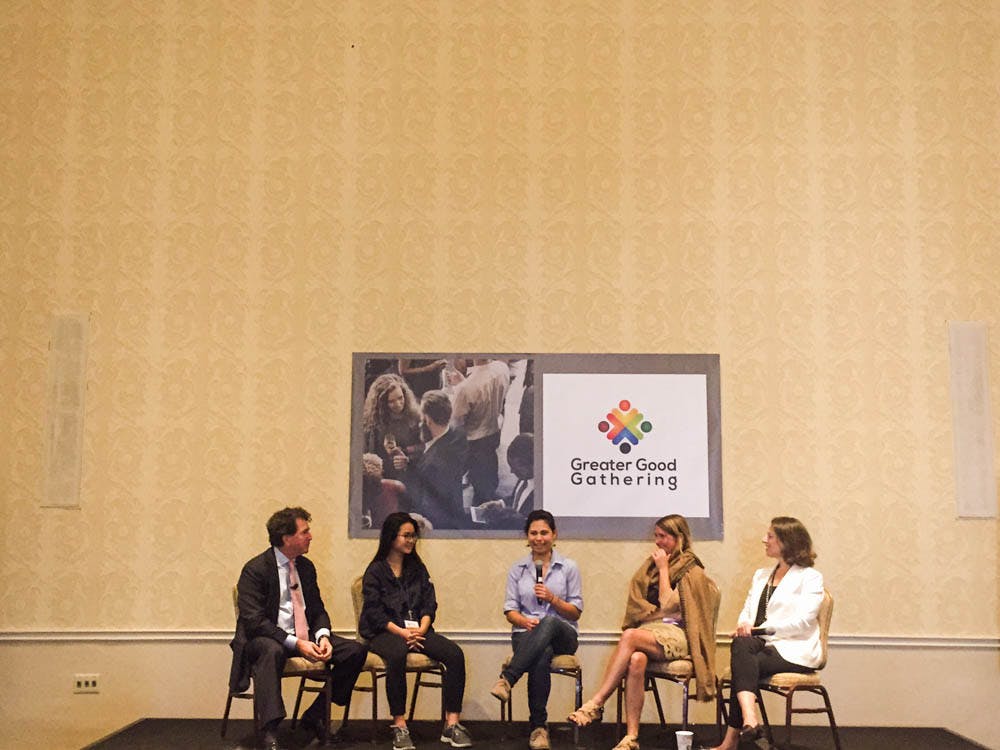The first Greater Good Gathering conference took place this weekend at the Providence Biltmore, featuring speakers from a host of different disciplines including Martin Luther King III. Under the slogan of “Charting a Path in Changing Times — Democracy, Citizenship & the Greater Good,” the conference featured panels, discussions and speeches on topics ranging from public sector innovation to the power of technology over the course of three days.
The organizer of the event, Eric Schnurer ’80 is both a Brown alum and a former adjunct professor at the University’s Taubman Center for Public Policy. He said that the gathering is part of a larger idea that he has been working on in conjunction with the University to increase discussion around initiatives and work that contributes to “the greater good.” He said he wanted to connect students, faculty and practitioners from different disciplines to work together to make the world a better place.
The original idea started with a few people brainstorming in Schnurer’s house about how to develop new for-profit social venture models for making constructive contributions, Shnurer said. He initially wanted to develop a “for-profit social venture” model to implement himself but realized the need for more conversations like the ones he was having. So, he established an annual meeting instead.
Martin Luther King III, the son of Martin Luther King Jr., initiated Saturday’s events with an address about “Doing Good in the 21st Century.” Remembering his father as both a man of action and a preacher, King reiterated his father’s ideas about how changing thoughts can lead to changing actions. He also emphasized the role of non-violent resistance in contributing to the public good.
In a panel called “Defending Democracy and the Future of the Public Good,” panelists talked about what democracy means and how to use it to serve the public good. They also had a heated discussion on whether and how technology can be “democratizing” force. Centering some of their discussion on the Women’s March, the panelists talked about the impact of social media on institutions and social movements.
After the panel, Kalev Leetaru, senior fellow at the Center for Cyber and Homeland Security at George Washington University, gave a talk on the different ways data is used to study human society and explained the concept of “big data.” He said that technology is a tool, not a savior, and talked about the misunderstanding that giving information solves everything. “Society always adapts,” he added.
He said that online polls about the 2016 elections failed because Democrats are generally more likely to use social media and this misled many of them to believe that nominee Hillary Clinton would easily win.
He also talked about the influential role of advertisements and companies on censoring and controlling the data on social media and the internet in general. Sometimes advertisers have more sway in the content on social media — regulating whether certain news stories can show up next to their ads, for example — than governments who want to censor social media platforms do, he said.
Several Brown students also attended the event to talk about the ways their innovations and entrepreneurship contributed to social good. These students include Cliff Weitzman ’16 , founder of Speechify. Weitzman, who was named to the Forbes 30 under 30 list at the age of 23, talked about his experience going through school with dyslexia. He said this led him to invent Speechify, an app which turns text into audiobooks using deep learning.
Another social entrepreneur, Maya Faulstich-Hon ’17.5, founder of Kulisha, spoke about changing norms around how society discusses “waste.” Her venture converts organic waste into a sustainable insect protein for use in animal feeds, thereby reducing organic waste, she explained to the audience.
Despite featuring many Brown students as speakers, the event had low student attendance. Schnurer said he hopes to attract more students as the event becomes more established and people hear about it from word of mouth. He encouraged students to attend the future conferences, which will be held annually from now on, saying that a well-rounded education should ask students to think and learn about how to contribute positively to the lives of others.





